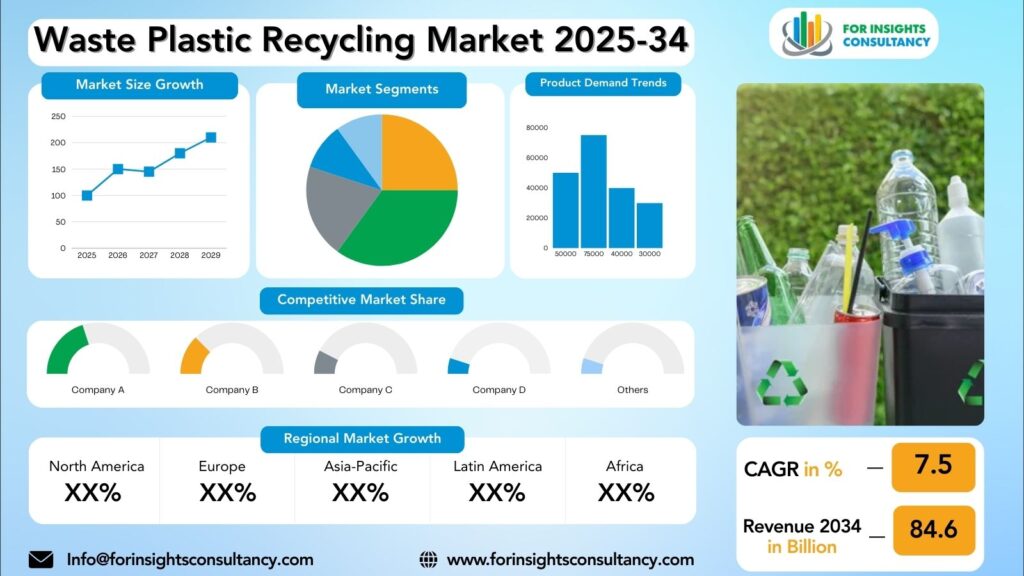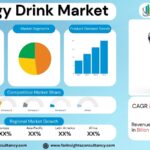
Waste Plastic Recycling Market Research Report by Plastic Type (Polyethylene Terephthalate (PET), High-Density Polyethylene (HDPE), Polyvinyl Chloride (PVC), Low-Density Polyethylene (LDPE), Polypropylene (PP), Polystyrene (PS), Other Plastics), By Process (Mechanical Recycling (Physical Reprocessing), Chemical Recycling (Advanced Recycling)), by Source, by End-Use Industry, and Region Global Market Analysis and Forecast, 2025-2034
Aug-2025 Formats | PDF | Category: Chemical | Delivery: 24 to 72 Hours
Waste Plastic Recycling Market is forecast to increase from USD 49.8 Billion in 2025 to USD 84.6 Billion by 2034, at a CAGR of 7.5%.
Waste Plastic Recycling Market: A Comprehensive Overview and Future Developments
The waste plastic recycling market has experienced significant growth in recent years due to global environmental awareness and the need for sustainable solutions to manage plastic waste. Governments worldwide are implementing strict regulations to promote recycling and reduce plastic waste, creating a favorable market environment for recycling companies. Manufacturers are increasingly incorporating recycled plastic into their products to meet consumer demand for eco-friendly products. Technological advancements have made it easier and more cost-effective to process and recycle different types of plastic waste, with advanced sorting systems, chemical processes, and material recovery techniques improving efficiency and quality.
Investment from both public and private sectors is attracting significant investment in recycling infrastructure to expand collection and sorting processes and develop innovative recycling technologies. The waste plastic recycling market is poised for continued growth and innovation, with key developments shaping the industry’s future. Circular economy practices, where resources are reused, recycled, and repurposed to minimize waste, are gaining traction in the market. Advanced recycling technologies, such as chemical recycling, pyrolysis, and depolymerization, are expected to revolutionize the waste plastic recycling market, offering new possibilities for recycling challenging plastics and extracting high-quality recycled materials.
Waste Plastic Recycling Market Dynamics
Growth Drivers
The global waste plastic recycling market is experiencing growth due to increasing environmental awareness, strict government regulations, and technological advancements. Governments are implementing strict regulations and incentives to encourage recycling efforts, boosting the market. Advanced processes like chemical recycling and pyrolysis are turning plastic waste into valuable resources. The demand for recycled plastics is on the rise as consumers and companies prioritize sustainability and seek eco-friendly products. The circular economy concept is gaining traction globally, making waste plastic recycling crucial for achieving a more sustainable and circular economy. Collaboration between governments, industries, and non-profit organizations is essential for the success of waste plastic recycling initiatives. Consumer behavior shifts, driven by increased environmental consciousness, are actively choosing products made from recycled materials, creating a demand for recycled plastics and driving the recycling market.
Restraints
The waste plastic recycling market faces several challenges, including inadequate infrastructure, contamination of plastic waste, and limited demand for recycled plastic materials. Many countries lack the necessary facilities and equipment to recycle large-scale plastic waste, leading to a lack of collection points, sorting facilities, and recycling plants. Governments and businesses need to invest in developing infrastructure to make recycling more accessible and convenient for consumers.
Contamination of plastic waste is another major restraint, as many items are not properly cleaned before being thrown into recycling bins. This contamination can lower the quality of recycled materials and make recycling difficult. Consumers should be educated on the importance of cleaning and preparing their waste for recycling, and recycling facilities should implement better sorting and cleaning processes.
Despite growing awareness of the importance of recycling plastic, there is still limited demand for recycled plastic materials, with many companies preferring virgin plastic resin due to concerns about the quality and consistency of recycled plastic.
Opportunities
The waste plastic recycling market is rapidly expanding, offering businesses opportunities to expand their operations and increase profitability. Key opportunities include the increasing demand for recycled plastic products, government incentives and regulations, technological advancements, and partnerships and collaborations. Consumers are becoming more environmentally conscious, leading to a growing demand for products made from recycled plastic. Businesses can capitalize on this trend by offering a wide range of recycled plastic products to customers. Governments are implementing policies and regulations to promote waste plastic recycling, attracting environmentally conscious customers. Investing in cutting-edge recycling technologies can give businesses a competitive edge. Collaborations with other businesses, recycling facilities, or research institutions can also help companies create innovative recycling solutions and expand their market reach.
Challenges
The waste plastic recycling market faces several challenges, including contamination of plastic waste, lack of infrastructure for proper collection and recycling, economic viability, public awareness, and technological limitations. Contamination of different types of plastics makes it difficult to separate and process them effectively, leading to lower quality recycled materials and higher processing costs. Limited recycling facilities and collection points in many areas further complicate the disposal process. Economic viability is another pressing issue, as it may be cheaper for companies to produce new plastic products rather than using recycled materials. Public awareness is also lacking, as many people may not understand the environmental impact of their plastic consumption. Technological limitations in plastic recycling processes can hinder industry growth, as current technologies may not be able to handle certain types of plastics or produce high-quality recycled materials. To address these challenges, governments, businesses, and individuals must invest in education, awareness campaigns, improving recycling infrastructure, and incentivizing the use of recycled materials. By working together, we can create a cleaner, greener world for future generations.
Waste Plastic Recycling Market Top Companies Covered In This Report:
Evaluate The Strategic Positioning And Innovation Pipelines Of Leading Market Companies-From Multinational Enterprises To Disruptive Regional Firms. Understand How Key Players Are Innovating, Expanding, And Capturing Value, And Use Competitive Benchmarks To Plan Your Next Move.
- Evergreen Plastics
- PolyQuest
- LyondellBasell
- Phoenix Technologies
- Verdeco Recycling
- Custom Polymers
- KW plastics
- Extrupet
- Greentech
- Veolia Polymers
- Hahn Plastics
- PLASgran
- APR2 Plast
- Luxus
- Viridor
- Centriforce
- Visy
- Kyoei Industry
- Wellpine Plastic Industical
- Fuqing Topway Plastics Industrial
- Intco
- Suzhou Jiulong Recy & Tech
- Longfu Recycling Energy Scientech
Waste Plastic Recycling Market News
Veolia Polymers
In mid-2025, Veolia announced the closure of its two plastic recycling facilities in Bernburg, Germany, citing “persistently challenging market conditions” and low prices for virgin plastics.
LyondellBasell
In September 2024, the company launched an advanced recycling facility in Germany, using its proprietary MoReTec technology to convert plastic waste into feedstock. This investment is part of its commitment to developing a circular economy for plastics.
Segmented View of the Industry:
The Waste Plastic Recycling Market Is Mapped Through A Multidimensional Lens-Tracking Shifts Across Product Type, Applications, And Geographic Regions. This Segmented Approach Enables Businesses To Localize Their Growth Plans And Align Offerings With The Most Profitable Demand Centers.
Segmentation by Plastic Type
- Polyethylene Terephthalate (PET)
- High-Density Polyethylene (HDPE)
- Polyvinyl Chloride (PVC)
- Low-Density Polyethylene (LDPE)
- Polypropylene (PP)
- Polystyrene (PS)
- Other Plastics
Segmentation by Process
- Mechanical Recycling (Physical Reprocessing)
- Chemical Recycling (Advanced Recycling)
Segmentation by Source
- Post-Consumer
- Post-Industrial
Segmentation by End-Use Industry
- Packaging
- Building & Construction
- Textile
- Automotive
- Consumer Goods
- Other Applications
Global Geographic Coverage:
The Report Provides In-Depth Qualitative and Quantitative Data On the Waste Plastic Recycling Market For All Of The Regions And Countries Listed Below:
North America
The United States is a leading country in waste plastic recycling, with numerous facilities and programs in place. The government promotes recycling initiatives through campaigns and awareness drives, with the Recycling Partnership playing a crucial role. The demand for recycled plastic materials is increasing due to the popularity of eco-friendly products. Canada is also making significant strides in waste plastic recycling, with advanced recycling technologies implemented in various provinces. The Canadian Plastics Industry Association is working to increase recycling rates and reduce plastic waste in landfills. Mexico is working to increase recycling rates and promote sustainable waste management practices, collaborating with industry stakeholders to develop a robust recycling infrastructure. The Mexican Association of Plastic Industries is playing a key role in promoting recycling initiatives and increasing consumer awareness.
Europe
Germany, France, Italy, the United Kingdom, and Spain are leading the way in waste plastic recycling. Germany has a well-established infrastructure for collecting and processing plastic waste, with companies like ALBA Group and Veolia leading the way in innovative recycling technologies. The German government has implemented strict regulations and policies to promote recycling and reduce plastic pollution. France is actively promoting plastic recycling through initiatives like the Extended Producer Responsibility (EPR) scheme, focusing on eco-friendly packaging solutions and increasing the use of recycled plastics in products. Italy is also investing in modernizing recycling facilities to meet the growing demand for recycled plastics. The United Kingdom has set ambitious targets to increase plastic recycling rates and reduce waste through initiatives like the Plastics Pact. Companies in the UK are investing in research and development to find innovative solutions for recycling challenging plastic waste streams. Spain is actively promoting plastic recycling through awareness campaigns and waste management initiatives, with a well-developed collection and recycling system. The Spanish government supports research and innovation in the recycling sector.
Asia Pacific
The Asia Pacific region is a major player in the global waste plastic recycling market, with countries like China, Japan, and India leading the way in technological advancements and sustainable practices. China is leading the charge in waste plastic recycling, with strict regulations and policies in place to promote recycling and reduce plastic pollution. Japan is known for its innovative approach to waste management, investing in cutting-edge technologies for plastic recycling. India faces a significant challenge in plastic waste, with rapidly growing urban populations contributing to the problem. However, the country is taking steps to promote recycling and reduce single-use plastic consumption. By working together and sharing best practices, the Asia Pacific region can create a more sustainable future for generations to come.
Middle East and Africa
The Middle East has seen a significant increase in waste plastic recycling efforts, with countries like Saudi Arabia, the United Arab Emirates, and Qatar investing heavily in recycling infrastructure to tackle the growing plastic waste problem. Saudi Arabia’s Vision 2030 initiative includes ambitious targets for increasing recycling rates and reducing plastic waste. The UAE is another key player in the waste plastic recycling market, investing in state-of-the-art recycling technology and infrastructure to process plastic waste efficiently. Qatar is also making significant efforts to promote waste plastic recycling within its borders, establishing recycling plants and initiatives to encourage responsible disposal of plastic waste.
In Africa, several countries are ramping up their waste plastic recycling efforts to combat the growing problem of plastic pollution. South Africa has made substantial progress in waste plastic recycling, creating recycling centers and programs across the country. Nigeria faces significant challenges in plastic waste management but is taking steps to address the issue through the implementation of recycling initiatives and awareness campaigns. Kenya is gaining momentum as more people become aware of the importance of proper waste management. The government has introduced regulations to promote recycling and reduce plastic pollution, and through public-private partnerships and community engagement, Kenya is making strides towards a circular economy for plastics.
Reasons to Buy:
- The Research Would Help Top Administration/Policymakers/Professionals/Product Advancements/Sales Managers And Stakeholders In This Market In The Following Ways.
- The Report Provides Waste Plastic Recycling Market Revenues At The Worldwide, Regional, And Country Levels With A Complete Analysis To 2034 Permitting Companies To Analyze Their Market Share And Analyze Projections, And Find New Markets To Aim For.
- To Understand The Most Affecting Driving And Restraining Forces In The Market And Their Impact On The Global Market.
- Major Changes And Assessment In Market Dynamics And Developments.
- The Objective Of The Waste Plastic Recycling Market Report Is To Identify New Business Opportunities Using Quantitative Market Forecasts.
- Formulate Sales And Marketing Strategies By Gaining An Understanding Of Competitors, Their Positioning, And Strengths & Weaknesses.
Faq – What Global Leaders Are Asking
What Is The Growth Prospect For The Waste Plastic Recycling Market By 2034?
Waste Plastic Recycling Market Is Expected To Achieve A Stable Growth Rate With A Compound Annual Growth Rate (Cagr) Of About 7.5% From 2025 Through 2034.
What Is Driving The Growth Of The Waste Plastic Recycling Market?
The growth of the waste plastic recycling market is driven by increasing global awareness of plastic pollution and stringent government regulations to combat it. This is further fueled by a strong push from major consumer brands to meet their sustainability goals by incorporating recycled plastics into their products.
Who Are The Key Players In The Waste Plastic Recycling Market, And What Are Their Market Shares?
The Waste Plastic Recycling Market Includes Major Companies Like Evergreen Plastics, PolyQuest, LyondellBasell, Phoenix Technologies, Verdeco Recycling, Custom Polymers, KW plastics, Extrupet, Greentech, Veolia Polymers, Hahn Plastics, PLASgran, APR2 Plast, Luxus, Viridor, Centriforce, Visy, Kyoei Industry, Wellpine Plastic Industical, Fuqing Topway Plastics Industrial, Intco, Suzhou Jiulong Recy & Tech, Longfu Recycling Energy Scientech.
Specific Market Share Data Is Not Publicly Available and Is Typically Provided In Detailed, Proprietary Market Research Reports.
Which Regions Are Leading the Waste Plastic Recycling Market Growth?
The Asia-Pacific region is the clear leader in the waste plastic recycling market, driven by its large population, rapid industrialization, and significant waste generation. While Europe and North America have high recycling rates, their market growth is primarily fueled by stringent government regulations and ambitious corporate sustainability goals.
Customization: We Can Provide Following Things
1) On Market More Company Profiles (Competitors)
2) Data About Particular Country Or Region
3) We Will Incorporate The Same With No Additional Cost (Post Conducting Feasibility).
Any Requirement Contact Us: Https://Www.Forinsightsconsultancy.Com/Contact-Us/
Table of Contents
For TOC Contact us: https://forinsightsconsultancy.com/contact-us/






